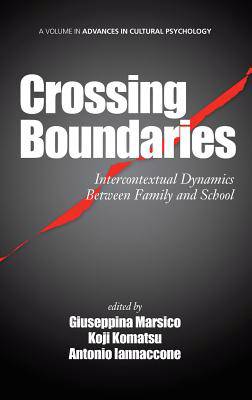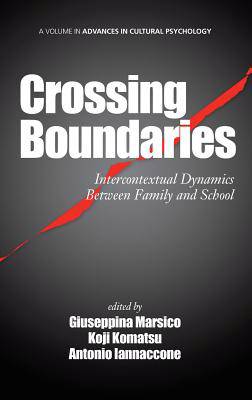
En raison d'une grêve chez bpost, votre commande pourrait être retardée. Vous avez besoin d’un livre rapidement ? Nos magasins vous accueillent à bras ouverts !
- Retrait gratuit dans votre magasin Club
- 7.000.000 titres dans notre catalogue
- Payer en toute sécurité
- Toujours un magasin près de chez vous
En raison de la grêve chez bpost, votre commande pourrait être retardée. Vous avez besoin d’un livre rapidement ? Nos magasins vous accueillent à bras ouverts !
- Retrait gratuit dans votre magasin Club
- 7.000.0000 titres dans notre catalogue
- Payer en toute sécurité
- Toujours un magasin près de chez vous
Crossing Boundaries
Intercontextual Dynamics Between Family and School (Hc)
Giuseppina Marsico, Koji Komatsu, Antonio Iannaccone
168,45 €
+ 336 points
Format
Description
This book brings in the focus on the borders between different contexts that need to be crossed, in the process of education. Despite the considerable efforts of various groups of researchers all over the World, it does not seem that traditional educational psychology has succeeded in illuminating the complex issues involved in the schoolfamily relationship. From a methodological perspective, there is no satisfactory explanation of the connection between representations and actual practice in educational contexts. Crossing Boundaries is an invitation to cultural psychology of educational processes to overcome the limits of existing educational psychology. Eemphasizing social locomotion and the dynamic processes, the book try to capture the ambiguous richness of the transit from one context to another, of the symbolic perspective that accompanies the dialogue between family and school, of practices regulating the interstitial space between these different social systems. How family and school fill, occupy, circulate, avoid or strategically use this space in between? What discourses and practices saturate this Border Zone and/or cross from one side to the other? Crossing Boundaries gathers contributions with the clear aim of documenting and analysing what happens at points of contact between family culture and scholastic/educational culture from the perspective of everyday life. This book is in itself an attempt to cross the border between the "theorizing on the borders" (and how "the outside world" and "the others" are perceived from a certain point of view) and "the practices" that characterize the school-home interaction.
Spécifications
Parties prenantes
- Auteur(s) :
- Editeur:
Contenu
- Nombre de pages :
- 404
- Langue:
- Anglais
- Collection :
Caractéristiques
- EAN:
- 9781623963958
- Date de parution :
- 16-07-13
- Format:
- Livre relié
- Format numérique:
- Genaaid
- Dimensions :
- 156 mm x 234 mm
- Poids :
- 739 g

Les avis
Nous publions uniquement les avis qui respectent les conditions requises. Consultez nos conditions pour les avis.






